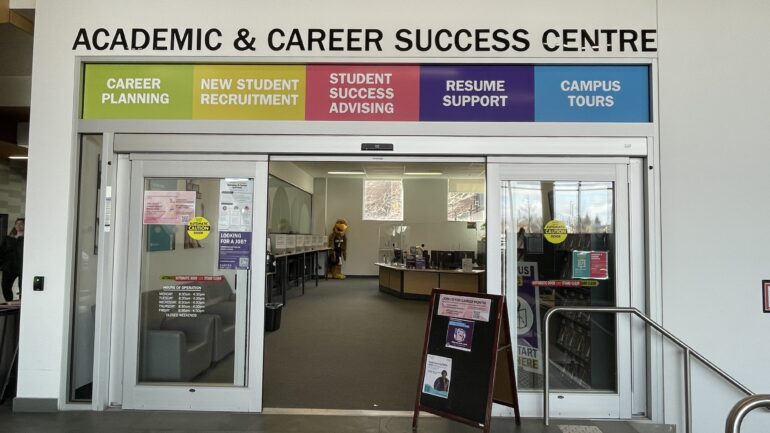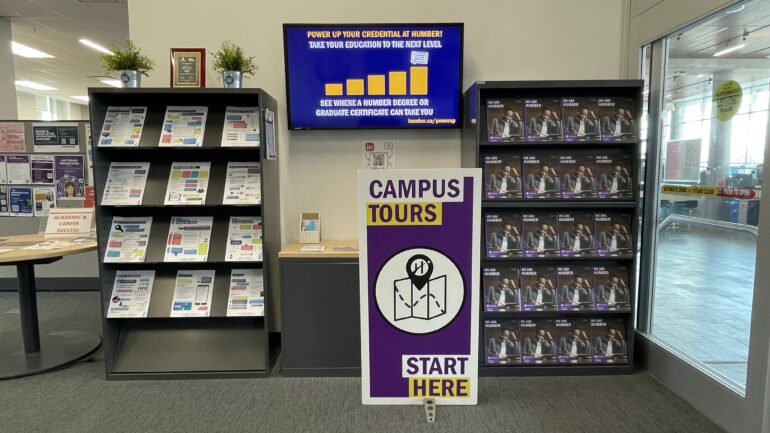Whether it’s a university or college in their hometown, or moving away to a school, post secondary education shapes students’ lives.
Paul Vanderburgt, 29, is a Student Recruitment Officer at Humber College. He started his current full-time position in November 2021 however, he has experience with the student recruitment office from when he was a student at Humber in 2015.

The Academic and Career Success Centre at Humber College North campus is there to help students. Photo credit: Maegan Lee
He said the goal of the student recruitment office is to become the first point-of-contact with students coming directly from high school.
“If you remember back to your time in high school, if there were a bunch of people in your gym at individual tables,” he said. “That was me.”
Vanderburgt said he visits an average of 150 high schools per year. Additionally, he holds one-on-one meetings with students to help them with their pre-enrollment questions.
He is an expert in helping students from high school successfully transition into post-secondary programs, both university and college degrees, diplomas, or certificates.
His knowledge is vast, and he has valuable advice from to his experience over the past eight years dealing with thousands of students.
1. Change is difficult, so don’t get discouraged.
“Finding out that you don’t like something at 17, 18, 19, is more valuable than you know,” Vanderburgt said.
He said many high school students are stressed and worried the program they choose to pursue will not be the right fit.
Further, students are worried about disappointing their families and wasting the money that goes into their studies, Vanderburgt said.
“Don’t be discouraged. Finish the semester if you’re in one, get the transfer credits and take the time to figure out what you like and don’t like,” he said.
Vanderburgt said many high school students going directly into post-secondary education grew up studying and preparing for university or college.
Many of them don’t get to experience enough to find out what they like, or even what they’re good at. Most of all, he said life happens and things change.
“Students and parents are so nervous about failure, or trying something and failing, that they just choose not to try at all,” Vanderburgt said. “Start small, earn credentials that you can use towards getting a job.”
2. Take a campus tour
“One of the ways I think a student can know a program is right for them is by taking a campus tour,” Vanderburgt said.

Campus tours are easily accessible to students by visiting the Academic and Career Success Centre. Photo credit: Maegan Lee
He said any program can be great, but sometimes, the community and the environment that students are in makes a big difference.
Making sure that the campus, their services, and the surrounding community is the right fit, is important to consider as well.
Vanderburgt said visiting the campus and attending open houses in-person to learn more about the institution is also helpful.
3. Get involved with something other than your classes
Vanderburgt said getting out of your comfort zone is important during the transition from high school to post-secondary. He said students should join clubs, get an on-campus job, or joining a varsity or intramural sports team to play a sport they love.
“By getting involved, it statistically improves an individual’s grades, and their attendance and likelihood to finish their program,” Vanderburgt said.
The Center for the Study of Student Life at The Ohio State University conducted a research study about the impacts of students being involved in co-curricular activities outside of their classes.
Students who were highly involved in co-curricular activities on campus were 18 per cent more career-ready and three times more likely to be considered by future employers compared to uninvolved students.
“College student involvement is positively related to academic performance, cognitive development, well-being, leadership and multicultural awareness,” the study stated.
Vanderburgt said finding friends outside of your program and finding like-minded people is a great way to improve your life in ways that you wouldn’t expect.
4. Scholarships, bursaries, and awards
Humber College gives out almost $7 million in the form of scholarships, bursaries, and awards, Vanderburgt said.
But many, if not all, Canadian universities offer a vast amount of money and opportunities for students looking to apply for funding.

Vanderburgt tells students not to pressure themselves into making a decision about their future post-secondary plans. Photo credit: Maegan Lee
“A significant amount goes unclaimed. I hear this from other schools as well,” he said. “It’s really unfortunate because these amounts don’t carry over.”
Vanderburgt said scholarship applications can also be submitted online, outside of university/college institutions, on websites like yconic.com or scholarships.com.
He said students should apply for any and all scholarships, even if they don’t meet all the requirements.
“If no one applies, they will give it to the next best applicant, the one who applied,” Vanderburgt said.
While the future is unknown and change is scary, student recruiters like Vanderburgt are there to help make transitions easier and less intimidating.
“Don’t put too much pressure on yourself to confirm that enrolment, until you’re ready,” he said.

